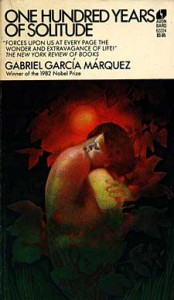I’ve long held an antipathy for high art, including serious modern literature (the kind that gets major awards). I appreciate the classics, but I thought modern lit was like pretentious modern art, a dot on a canvas that costs a million dollars because it represents the inimitable sensation of modern ennui and man’s fundamental disconnection from himself.
Which is why I’m so glad I know Nick. He’s dived deep into literature, and returns with many pearls.
Among them is Gabriel Garcia Marquez’s One Hundred Years of Solitude. At about 350 pages in paperback, it’s a fairly long book, and unconcerned with traditional narrative. Nevertheless, it sucked me in with its multi-generational story and characters that felt wild and real.
Marquez’s style is conversational yet lucid, like a bright retiree describing her childhood. Indeed, apparently Marquez has said that he tried to mimic the style of his grandparents’ stories. The whole novel is grounded in workaday situations, in sweeping the halls and falling in love and hating your sister. Some of it’s good, and some of it’s bad, and it’s all real.
Which brings up one of the biggest surprises of the novel: its magical realism. Things happen that can’t happen, but are mentioned casually, as though those events surprised nobody.
Happily, this is not mere style; it is integral to the narrative and, judging from later events, to a point about what’s real.
From the first page, I was swept into a multi-generational story of people living in a big house, dealing with luck and weather and all the drama of other people. They make choices, and the consequences ripple down the years. Yet it doesn’t feel like a sweeping epic; indeed, the action usually remains within the walls of the family’s house.
Marquez kept me interested in the most mundane, the most evil, and the sweetest of acts. Reading the book was magic.

I am sure you will have to discuss it with Nick when you finish:}
Linda Grady Oxford liked this on Facebook.